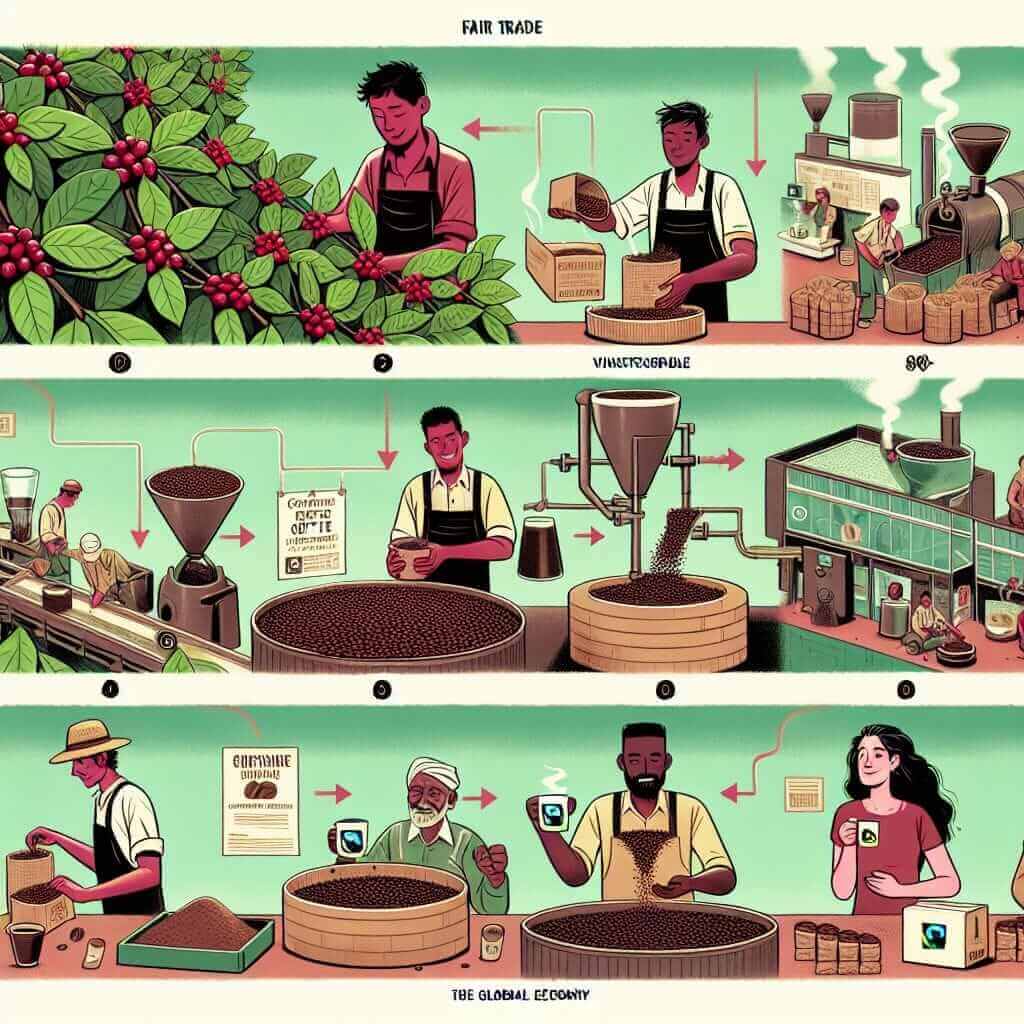Fair trade practices in global commerce have become an increasingly important topic in today’s interconnected world. Keywords like “fair trade,” “global commerce,” “ethical business practices,” and “sustainable development” frequently appear in IELTS Writing Task 2 prompts. This essay will explore the significance of fair trade practices in the context of global commerce, focusing on the potential topics that such a subject might cover in the IELTS exam.
Potential Essay Topics:
- “To what extent do you agree or disagree that fair trade practices are essential for sustainable development in global commerce?”
- “Discuss the advantages and disadvantages of implementing fair trade practices in the global market.”
- “How do fair trade practices impact developing countries in the context of global commerce?”
Selected Topic and Analysis
Let’s choose the first topic for our essay: “To what extent do you agree or disagree that fair trade practices are essential for sustainable development in global commerce?”
Topic Analysis
- Keywords: Fair trade practices, sustainable development, global commerce.
- Task Requirement: Discuss and provide an opinion, referring to both sides of the argument.
Sample Essay
Introduction
Fair trade practices have garnered considerable attention as a means to promote ethical business operations and sustainable development in global commerce. This essay will argue that fair trade practices are not only essential but also indispensable for achieving sustainability and equity in international trade.
Body Paragraph 1
Firstly, fair trade practices ensure that producers in developing countries receive a fair share of profits. This system aims to reduce poverty by providing better trading conditions, thereby enabling producers to improve their livelihoods and invest in their communities. For instance, fair trade-certified coffee farmers receive a premium price for their products, which allows them to support their families, send their children to school, and access healthcare services. By bridging the wealth gap between developed and developing nations, fair trade practices contribute significantly to sustainable development.

Body Paragraph 2
Additionally, fair trade practices encourage environmentally sustainable farming methods. Many fair trade certification programs include strict environmental standards, which require producers to adopt sustainable agricultural techniques such as crop rotation, organic farming, and reducing chemical usage. These practices help to preserve biodiversity, reduce soil degradation, and mitigate climate change. As a result, the promotion of fair trade can lead to more sustainable and eco-friendly agricultural sectors worldwide.
Body Paragraph 3
However, some critics argue that fair trade practices can lead to higher prices for consumers and limited market access for non-certified producers. The fair trade premium can make products more expensive, potentially reducing consumer demand. Furthermore, small-scale producers who cannot afford certification may find themselves excluded from lucrative fair trade markets. Despite these challenges, the long-term benefits of fair trade practices—such as improved living standards and environmental conservation—far outweigh the short-term drawbacks.
Conclusion
In conclusion, fair trade practices are crucial for sustainable development within global commerce. By ensuring fair compensation for producers, promoting environmental sustainability, and fostering economic equity, fair trade serves as a powerful tool to address some of the most pressing issues in international trade. While there are criticisms regarding cost and market accessibility, the overall positive impacts make fair trade an essential component of a fairer and more sustainable global economy.
Word Count: 346
Important Notes for Writing the Essay
- Vocabulary: Use varied and precise vocabulary relevant to the topic. Examples include “sustainable development,” “ethical business operations,” “certification programs,” “environmental conservation,” and “economic equity.”
- Grammar: Focus on complex sentence structures and correct use of tenses. Ensure subject-verb agreement and proper punctuation.
- Formatting: Structure your essay with clear paragraphs, each focusing on a specific point supporting your argument.
- Cohesion and Coherence: Use linking words (e.g., “firstly,” “additionally,” “however,” “in conclusion”) to connect ideas smoothly.
Difficult Vocabulary
- Equity (noun) [ˈɛkwɪti]: The quality of being fair and impartial.
- Mitigate (verb) [ˈmɪtɪɡeɪt]: To make less severe, serious, or painful.
- Biodiversity (noun) [ˌbaɪoʊdaɪˈvɜrsɪti]: The variety of plant and animal life in a particular habitat.
- Degradation (noun) [ˌdɛɡrəˈdeɪʃən]: The condition or process of degrading or being degraded.
- Premium (noun) [ˈpriːmiəm]: An amount paid in addition to a standard rate.
Conclusion
In summary, the importance of fair trade practices in global commerce cannot be overstated. These practices not only support economic and social sustainability but also encourage environmentally conscious production methods. Learners preparing for the IELTS Writing Task 2 should be ready to discuss various aspects of fair trade, ranging from its benefits to its potential drawbacks. Practice writing on related topics such as ethical business practices and sustainable development to improve both vocabulary and essay structure.
More potential topics for practice:
- “Examine the role of consumer awareness in promoting fair trade practices.”
- “Evaluate the long-term economic impacts of fair trade on global markets.”
- “Compare and contrast fair trade norms in developed and developing countries.”